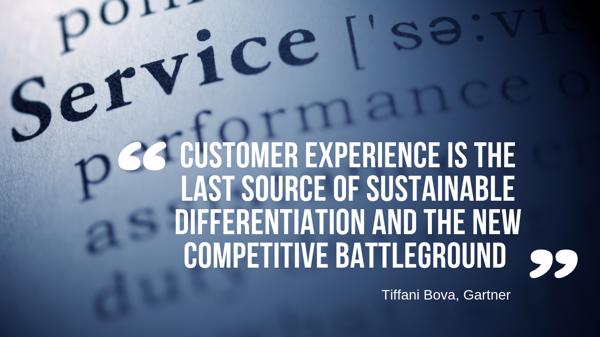
The only true differentiator in the digital world is customer experience
The digital era has fundamentally changed how consumers are influenced to buy a product or service. We now have access to so much information before we make a purchasing decision that we’re able to appraise more than just the product or price. We’re turning to peer reviews and influencers to help us to decide to try a brand for the first time, and we can quickly scrutinise brands from independent opinions. Others’ experiences of a brand are now the biggest influence on our choice to buy, and research shows that a bad experience will be shared by 95% of dissatisfied customers (Zendesk, 2013), so control of how brands are perceived has shifted from the brand to the consumer.
Brand success is no longer defined by clever advertising, and loyalty isn’t guaranteed simply by offering a great product. The future of brand success is all about customer experience.
“86% of buyers would pay more for a better customer experience.” Walker, 2017.
A consumer-first approach
It doesn’t matter what industry or sector you’re in, you can’t ignore customer experience. Consumer expectations have been defined by the likes of Amazon and Uber, who deliver simple, personalised, automated services through a digital-first approach. As a result, we’re all becoming more and more accustomed to fast, low touch, customer-centric experiences in every aspect of our daily life. Buying habits have changed at an unprecedented pace because of technology that simplifies the customer experience.
“You’ve got to start with the customer experience and work back toward the technology – not the other way around.” Steve Jobs, Co-Founder of Apple.
Consumers also have more control and understanding of how businesses use their data than ever before, and they’re interacting with businesses across many different channels. This fundamentally changes the traditional tactics that marketers have relied upon because brands aren’t controlling the customer journey in the way they did before. Delivering consistently across omnichannel interactions is a challenge for brands that must be addressed – fast!
“78% of companies rate improving their omnichannel experience as ‘business critical’.” Zebra, 2017
In this consumer-led era, generic Welcome strategies, price promotions, product-driven upsell and cross-sell strategies aren’t delivering the returns they did before because they don’t have customer needs at the heart. Brands need to recognise that CX has to be at the centre of every interaction in order to meet consumer expectations, garner recommendations and convince customers to stay loyal. This requires a significant shift in how business is done – and automation is at the heart of this shift.
“70% of the customer’s journey is based on how the customer feels they are being treated.” McKinsey & Company study.
Experience over price and product
A Walker study predicts that “by the year 2020, customer experience will overtake price and product as the key brand differentiator.”
In recent years, we’ve seen how long-established brands have quickly succumbed to a failure to respond to the shift in consumer expectations. The businesses that are thriving are those that have invested in technology that improves accessibility and enables fast, simpler interactions, 24/7. We’re seeing ever-increasing adoption of cloud-based technologies and automated “human touch” customer support services that enable customer relationships to be managed effectively from anywhere, at any time. But that alone is not enough.
Every department across a business needs to work together in order to deliver true customer-centric experiences. Intelligent Automation has the power to connect data, people and processes to rapidly enable businesses to do just that.
How would your business benefit if you had instant access to a 360° customer view, customer journey tracking, predictive modelling, and sales and marketing insight data, all via one collaboration tool? This is a reality for businesses who have embedded automation into their business strategy and are adopting disruptive technologies like AI and Machine Learning into their business processes.
“By 2020, 40% of commerce transactions will be enabled by cognitive/AI personal shoppers and conversational commerce solutions.” IDC, 2017.
Intelligent Automation revolutionises collaboration throughout organisations, enabling businesses to be more agile and deliver better customer experiences. Common business processes can be automated and siloed systems can be integrated to create one central data source. This enables businesses to manage ‘big data’ effectively to drive the business forward and deliver faster, more informed customer interactions.
Get in touch today to find out how we can deliver an intelligent automation solution that will revolutionise your customer experience.